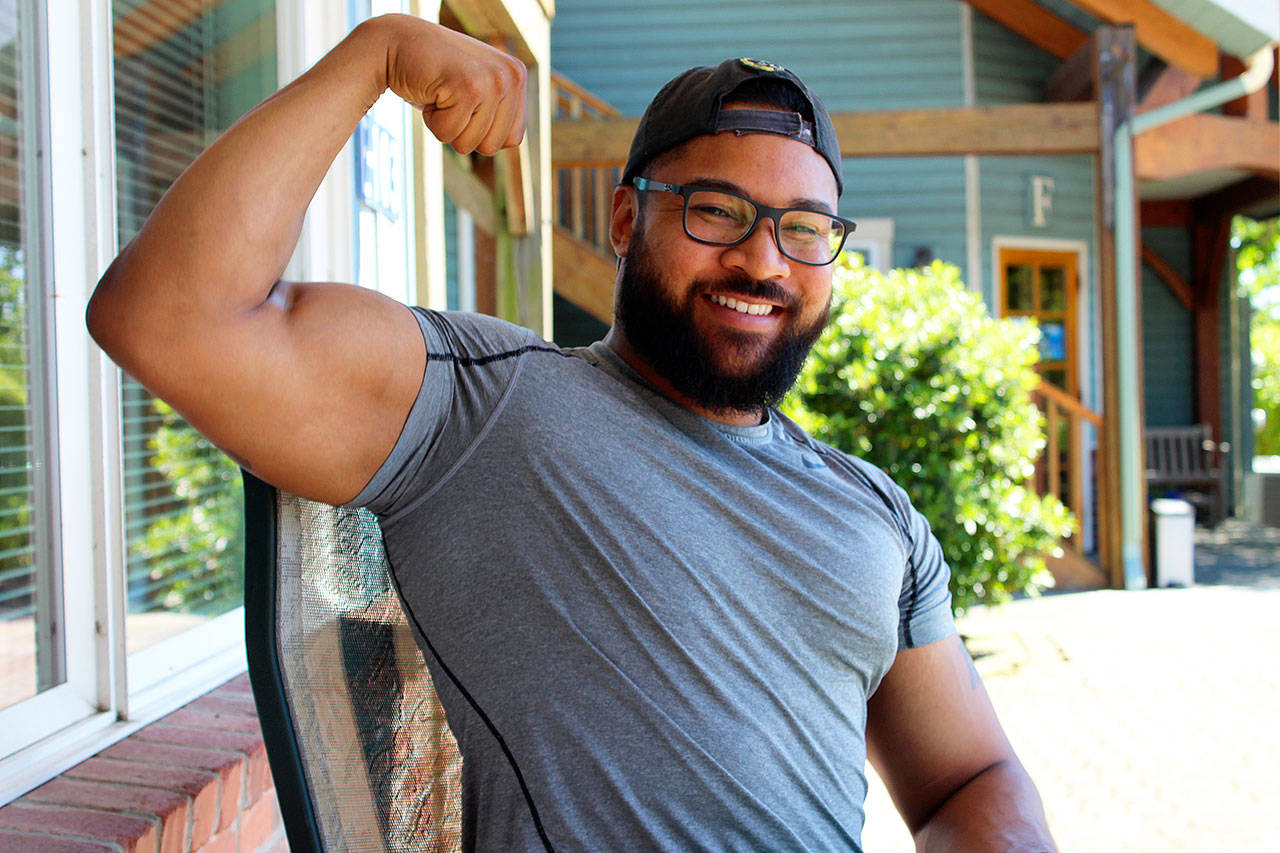Whidbey Island’s own Hercules completed another challenge-with-a-cause recently in the name of bringing attention to the high suicide rate among veterans.
April 11, Michael McCastle started running 20 miles every day for 100 consecutive days. His quest ended July 19 near Portland.
McCastle chose 20 miles as a daily goal because the Department of Veterans Affairs estimates 20 to 22 vets kill themselves every day.
“It’s a silent war against an invisible enemy,” he said during a stop in Coupeville on Day 88 after completing a 20-mile loop near Deception Pass.
McCastle collected donations for two non-profit organizations, Operation Enduring Warrior and the National Alliance to End Veteran Suicide.
This is his sixth feat of strength and endurance he’s pursued in the last several years for his Twelve Labors Project, which has the multiple missions of raising awareness and money for selected causes, inspiring others and breaking world records along the way.
McCastle served at Naval Air Station, Whidbey Island from 2013 to 2016, specializing in air traffic control. He now lives in Vancouver, Wash., or wherever his challenges and advocacy take him.
Following his 100-day run, he led a three-day retreat in Oregon for veterans.
“He’s such an inspiration to people,” said Rodd Wittmier, of Buckley, Wash., who founded the National Alliance to End Veteran Suicide. “People can’t comprehend him but they relate to him, as someone who cares. It’s not about Michael. It’s about the mission, it’s about the cause.”
McCastle named his project after the legend of Hercules, a Greek mythological hero known for his physical and inner strength and pursuit of 12 seemingly impossible hardships.
“I do increasingly difficult feats of endurance. I want to inspire people to challenge themselves,” he explained. “People associate pain with suffering, but not all pain is bad. Maybe people will remember pain is a useful indicator of pushing your body.”
McCastle’s endurance feats have raised $30,000 for charity, according to his website, and landed him in the record books several times.
His first feat in 2013 involved a 50K run while wearing a 40-pound vest to benefit Children’s Cancer Research.
At 6 feet, 2 inches and weighing 233 pounds, McCastle’s rock-solid body has taken a beating, and occasionally breaks down.
During his 2014 first attempt at breaking the world’s 24-hour record for pull-ups, he had to stop short of his goal.
“I tore my forearm muscles and biceps, I suffered acute kidney damage and had holes in my hands,” he recalled. He also required a two-day stay at WhidbeyHealth Medical Center.
But a few months later in winter cold and whipping winds, McCastle flipped a 250-pound tire for 10 hours, going a distance equaling 13 miles in a downtown Oak Harbor parking lot.
In May 2015, McCastle climbed a 20-foot rope 1,450 times to equal 29,029 feet — the height of Mount Everest — in just under 27 hours to raise funds for Parkinson’s research. McCastle’s father, an Army veteran, died after battling the disease.
Four months after that, McCastle took another crack at pull-ups at Oak Harbor’s North End Fitness Center. He beat the Guinness World Record for the most pull-ups in 24 hours — 5,804.
And he did it with a 30-pound pack on his back to represent the burden felt by many veterans. His pull-up challenges raised nearly $10,000 for the Wounded Warrior Project, a service organization that offers a variety of programs, services and events for wounded veterans.
In May 2016, McCastle pulled a 2016 Ford F-150 pickup truck for 22 miles in 19 hours across California’s Death Valley, also to raise awareness for the staggering suicide rate of military men and women.
Every 65-72 minutes, another veteran takes their own life, according to the Department of Veterans Affairs. Totaling between 7,300-8,030 deaths per year, military suicides account for 20 percent of all suicides in the United States.
The biggest age spikes are over 50 years old and between 18 to 25.
Isolation plays a huge role in veterans’ cascading mental health crises, Wittmier said.
“If you have PTSD, if you’ve suffered military sexual trauma or a traumatic brain injury, isolation becomes part of the norm,” he said. “And the more you isolate, the more you won’t survive.”
While both McCastle and Wittmier acknowledge the military is finally addressing mental health needs of active and retired personnel, government services can’t keep up with demand.
“What I’m advocating is for communities to reach out,” McCastle said. “Vets who are suffering, they want relief and they’re not going to get it standing in line at the V.A.”
McCastle revealed he’s lost three friends to suicide.
“None of them were at the base here,” he said. “They were from different duty stations.”
Although marketing himself and his accomplishments are necessary to his mission, McCastle describes his cause as greater than himself.
“There are veterans out there that don’t have a strong enough voice right now,” he said. “So for me, this is a lifetime endeavor. “


